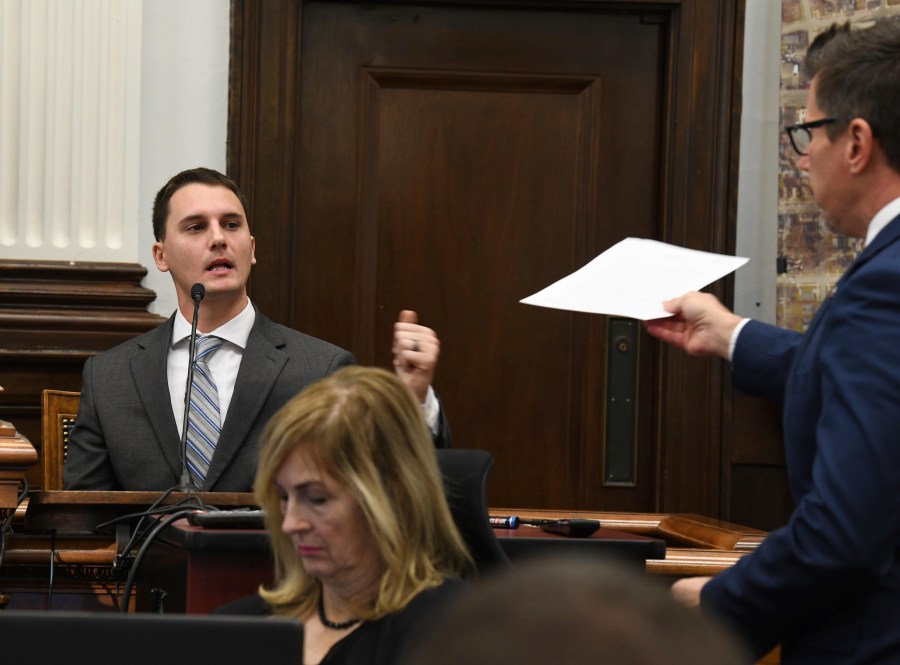KENOSHA, Wis. (AP) — The first man shot and killed by Kyle Rittenhouse on the streets of Kenosha was acting “belligerently” that night but did not appear to pose a serious threat to anyone, a witness testified Friday at Rittenhouse’s murder trial.
Jason Lackowski, a former Marine who said he took an AR-15 semi-automatic rifle to Kenosha last year to help protect property during violent protests against racial injustice, said that Joseph Rosenbaum “asked very bluntly to shoot him” and took a few “false steppings … to entice someone to do something.”
Lackowski got up from the witness stand and demonstrated what he called “false stepping.” He took a small step and slight lurch forward, then stopped.
But Lackowski, who was called as a witness by the prosecution, said he viewed Rosenbaum as a “babbling idiot” and turned his back and ignored him.
His testimony showed a contrast between how the military veteran viewed Rosenbaum and earlier testimony that Rittenhouse — who was 17 at the time — may have perceived Rosenbaum as a threat.
Rittenhouse, now 18, is charged with shooting three men, two fatally, in the summer of 2020. The onetime police youth cadet had gone to Kenosha with an AR-style rifle and a medical kit in what he said was an effort to safeguard property from the demonstrations that broke out over the shooting of Jacob Blake, a Black man, by a white Kenosha police officer.

Rittenhouse is white, as were those he shot. Prosecutors have portrayed Rittenhouse as the instigator of the bloodshed, while his lawyer has argued that he acted in self-defense, suggesting, among other things, that Rittenhouse feared his weapon would be taken away and used against him.
On Thursday, Richie McGinniss, who was recording events on a cellphone that night for the conservative website The Daily Caller, testified that Rosenbaum chased Rittenhouse and was gunned down as he lunged for the young man’s rifle.
A state crime lab DNA analyst testified Friday that she tested the barrel guard from Rittenhouse’s rifle and did not find DNA from Rosenbaum or the other man killed that night, Anthony Huber. But Amber Rasmussen said she received no swabs from the actual barrel of the gun and would have no way of knowing if Rosenbaum touched it.
Under cross-examination by Rittenhouse attorney Corey Chirafasi, Rasmussen was shown still images of Huber and Rittenhouse and agreed they appeared to show Huber touching the rifle. She also acknowledged that the absence of Huber’s DNA on the gun doesn’t mean he didn’t touch it.
Also Thursday, Ryan Balch, a former Army infantryman who carried an AR-style rifle that night and walked around patrolling the streets with Rittenhouse, testified that Rosenbaum was “hyperaggressive and acting out in a violent manner,” including trying to set fires and throwing rocks. Rosenbaum also angrily threatened to “f—— kill” both Balch and Rittenhouse, Balch testified.
In testifying about what they were doing in Kenosha, Lackowski and Balch both used military terminology that reflected their backgrounds. Lackowski referred to “areas of occupation,” talked about taking up his “post” in a parking lot, and said he was trained in “shout, shove, show, shoot.”
“You shout, you shove, you show your firearm and you shoot,” Lackowski explained.
Balch used the term “plate carrier,” which he explained means body armor. He gave a detailed explanation of the differences between full metal jacket bullets and hollow points, and talked about ensuring the armed citizens in Kenosha that night worked in pairs to protect each other.

According to testimony, Rosenbaum, 36, was unarmed and did not hurt anyone that night.
His killing has emerged as one of the most crucial moments that night and one of the few not clearly captured on video. It set in motion the bloodshed that followed moments later.
Rittenhouse shot and killed Huber, a 26-year-old protester seen on bystander video hitting Rittenhouse with a skateboard. Rittenhouse then wounded Gaige Grosskreutz, 27, who had a gun in his hand as he stepped toward Rittenhouse.
Rittenhouse could get life in prison if convicted in the case that has stirred furious debate over self-defense, vigilantism, the right to bear arms and the racial unrest that erupted around the U.S. after the killing of George Floyd in Minneapolis and other cases like it.
Before court resumed Friday, the judge granted a pregnant juror the request to be dismissed because she was experiencing discomfort. She was the second juror dismissed: A retired man was dropped from the case Thursday after making a joke about Blake’s shooting.
Eighteen people remain on the panel: Twelve will be designated to decide the case; the rest are alternates.





